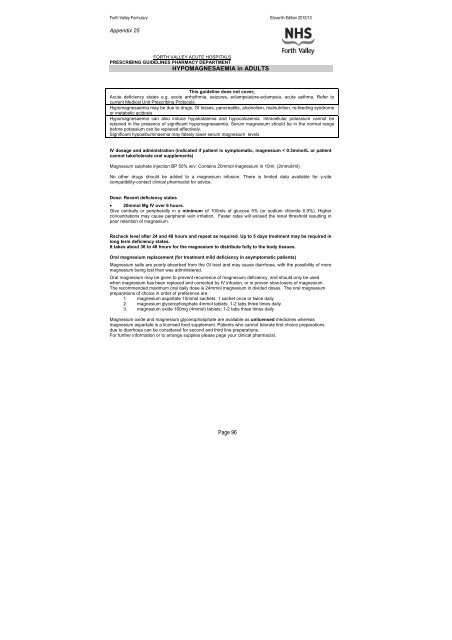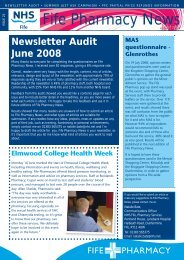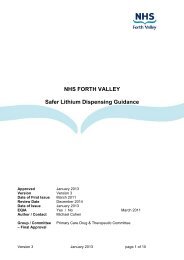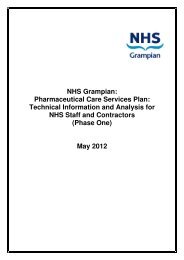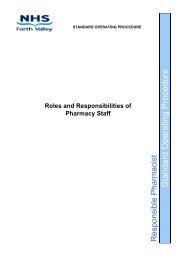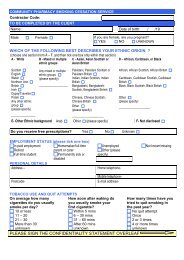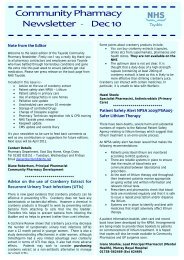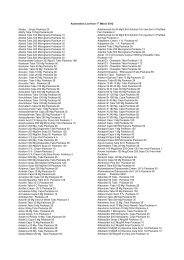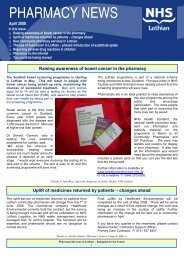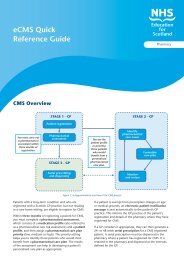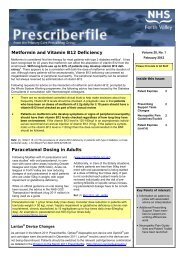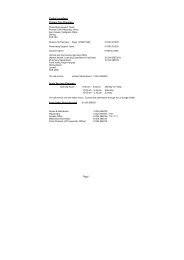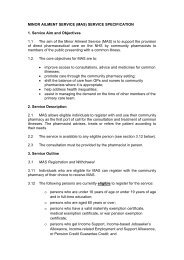nhs forth valley formulary 11 - Community Pharmacy
nhs forth valley formulary 11 - Community Pharmacy
nhs forth valley formulary 11 - Community Pharmacy
You also want an ePaper? Increase the reach of your titles
YUMPU automatically turns print PDFs into web optimized ePapers that Google loves.
Forth Valley Formulary Eleventh Edition 2012/13Appendix 25FORTH VALLEY ACUTE HOSPITALSPRESCRIBING GUIDELINES PHARMACY DEPARTMENTHYPOMAGNESAEMIA in ADULTSThis guideline does not cover:Acute deficiency states e.g. acute arrhythmia, seizures, eclampsia/pre-eclampsia, acute asthma. Refer tocurrent Medical Unit Prescribing Protocols.Hypomagnesaemia may be due to drugs, GI losses, pancreatitis, alcoholism, malnutrition, re-feeding syndromeor metabolic acidosisHypomagnesaemia can also induce hypokalaemia and hypocalcaemia. Intracellular potassium cannot beretained in the presence of significant hypomagnesaemia. Serum magnesium should be in the normal rangebefore potassium can be replaced effectively.Significant hypoalbuminaemia may falsely lower serum magnesium levelsIV dosage and administration (indicated if patient is symptomatic, magnesium < 0.3mmol/L or patientcannot take/tolerate oral supplements)Magnesium sulphate injection BP 50% w/v: Contains 20mmol magnesium in 10ml. (2mmol/ml)No other drugs should be added to a magnesium infusion. There is limited data available for y-sitecompatibility-contact clinical pharmacist for advice.Dose: Recent deficiency states• 20mmol Mg IV over 6 hours.Give centrally or peripherally in a minimum of 100mls of glucose 5% (or sodium chloride 0.9%). Higherconcentrations may cause peripheral vein irritation. Faster rates will exceed the renal threshold resulting inpoor retention of magnesium.Recheck level after 24 and 48 hours and repeat as required. Up to 5 days treatment may be required inlong term deficiency states.It takes about 36 to 48 hours for the magnesium to distribute fully to the body tissues.Oral magnesium replacement (for treatment mild deficiency in asymptomatic patients)Magnesium salts are poorly absorbed from the GI tract and may cause diarrhoea, with the possibility of moremagnesium being lost than was administered.Oral magnesium may be given to prevent recurrence of magnesium deficiency, and should only be usedwhen magnesium has been replaced and corrected by IV infusion, or in proven slow-losers of magnesium.The recommended maximum oral daily dose is 24mmol magnesium in divided doses. The oral magnesiumpreparations of choice in order of preference are:1. magnesium aspartate 10mmol sachets; 1 sachet once or twice daily2. magnesium glycerophosphate 4mmol tablets; 1-2 tabs three times daily3. magnesium oxide 160mg (4mmol) tablets; 1-2 tabs three times dailyMagnesium oxide and magnesium glycerophosphate are available as unlicensed medicines whereasmagnesium aspartate is a licensed food supplement. Patients who cannot tolerate first choice preparationsdue to diarrhoea can be considered for second and third line preparations.For further information or to arrange supplies please page your clinical pharmacist.Page 96


